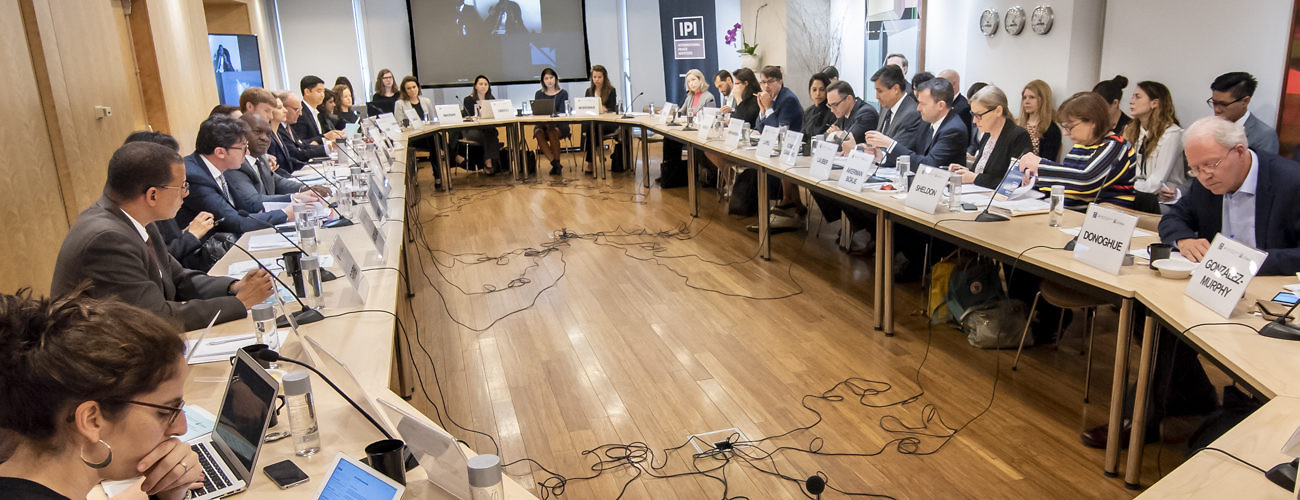The number of international migrants has grown by 49% since 2000, according to United Nations statistics, and incoming migrants often move to cities, which house 54% of the world’s population. Multilateral deliberations on migration policy tend to focus on the national level, although it is municipal leadership that often bears the brunt of providing services and facilitating integration for migrants. Developing appropriate and effective policy on migration requires perspective from the ground to be shared with national and international actors.
In October 2016, the UN General Assembly Adopted the New York Declaration for Refugees and Migrants, which created an international commitment to future negotiations, an international conference, and the adoption of a global compact for safe, orderly, and regular migration in 2018 (GCM). On May 9th, IPI held a meeting to discuss how the compact’s policies can be more comprehensive and effectively put into place.
The event, hosted in collaboration with the Global Policy Initiative, Columbia University, the University of Ottawa, and The Open Society Foundations, was conducted under the Chatham House Rule of non-attribution, and brought together key stakeholders in the compact’s implementation. Included were international mayors, UN representatives, and members of civil society.
Among the speakers were Penny Abeywardena, New York City Commissioner for International Affairs; Bitta Mostofi, Acting Commissioner of the Mayor’s Office of Immigrant Affairs in New York; Majid Batambuze, Mayor of Jinja, Uganda, and Chairman of the Urban Authority of Uganda; Cosimo Palazzo, Director of the Social Policy Department of Milan, Italy; Veronique Lamontagne, Director of the Bureau of Integration, Montreal, Canada; David Barclay, the Mayor’s Adviser on Inclusion in Bristol, UK; Eloisa Arruda, Human Rights Secretary in São Paulo, Brazil; Juan José Gómez Camacho, Permanent Representative of Mexico to the UN; Griet Seurs, Permanent Representative of Belgium to the UN; Jürg Lauber, Permanent Representative of Switzerland to the UN; Colleen Thouez, Division Director of Welcoming and Integrated Societies at the Open Society Foundations–International Migration Initiative; Gregory Maniatis, OSF Initiative’s Director; Eva Åkerman Börje, Senior Policy Adviser, Office of the Special Representative of the Secretary-General for International Migration; and Suzanne Sheldon, Senior Policy Adviser of the Global Compact for Migration at IOM. Speaking for IPI was Vice President Adam Lupel, who moderated the discussion.
Speakers in the session noted that there is a common misunderstanding of the distinction between refugees and migrants, as well as documented and undocumented migrants, and migrants often face prejudice upon entering a country. City leadership does not determine who enters the country, but, speakers noted, it can be responsible for the treatment of migrants when they enter city parameters.
Participants asserted that city leaders could design meaningful migration programs, not because they are more creative or well-resourced, but because they operate at a more human scale. In a much commented upon statement, one speaker said, “People belong to a local community before they belong to a nation.”
The conversation stressed that integration does not stop just across the border, and neither should policy. For this reason, to ensure safe and orderly migration, cities should not only share principles of policy reform with their national governments, but they should also share insights among other cities worldwide.
However, participants noted, member states negotiate on behalf of the nation. Speakers encouraged city leaders to strengthen conversation with their representatives at the state level and ensure their advocacy is representative of the population.
Of concern to many speakers was a lack of information sharing between members of the municipal and federal governments, since records of immigration are often housed at the national level. Participants cited examples where the central government did not share migration data with the cities where migrants lived. A lack of data and regularly updated statistics of migrations as well as a lack of migration management systems make it difficult to monitor the exact impact of migration. In order to do so, comprehensive indicators need to be developed, and all migrants need to be documented.
Speakers in the session noted that a link could be made between improving migration policy and the UN Sustainable Development Goals. Rather than intergovernmental organizations prescribing a solution to migration, participants declared, the best outcome is a policy that grows organically from the steps that city officials take, separate from institutions like the IOM and UN.








